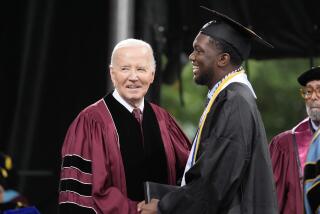The famed Morehouse College Glee Club celebrates its 100th year
- Share via
Halfway through rehearsal, the basses got an earful.
“Your start is too aggressive! Like boom, boom, flap, flap, upside the head,” conductor David Morrow shouted Sunday from a dark spot offstage in Club Nokia at L.A. Live. “It’s not about the volume, it’s about the quality.”
And with that, the Morehouse College Glee Club — the world-renowned, historically black, all-male choir that has sung at the Olympics, the Super Bowl and the funeral of the Rev. Martin Luther King Jr. — humbly cleared their throats and gave perfection another try.
The group was to perform its 100-year celebration concert to a sold-out audience in just a few hours. Among the songs they’d rehearsed for the occasion had the lyrics: “Whatever you do, strive to do it so well that no man living and no man dead and no man yet to be born can do it better.”
Judging by the way the young men locked focus on Morrow — on his hands, on his eyes, on his faintest muttering and slightest facial expression — their aim was precisely that.
With a repertoire that encompasses spirituals, adapted operas and the work of contemporary composers, the Morehouse glee club has stayed in demand year after year, performing on national and international tours. It has become the principal ambassador of Morehouse, the prestigious, historically black, all-male college in Atlanta.
Now, if only they could get people to quit comparing them to “Glee,” the television hit about a group of misfit teenagers who dance and sing in a high school choir. Ever since the show started airing in 2009, audiences have expected the Morehouse group to deliver jazzy, over-the-top musical routines.
“I get asked a lot, ‘Who’s your choreographer?,’” Morrow said. “And I say, ‘What?’ We only have one number where we move.”
Still, the Morehouse glee club doesn’t lack style: The men wear sharp suits even on plane flights, and they walk onstage with short, brisk steps.
Then there’s its tight-knit history. Since its formation in 1911, the club has had only three official directors (Morrow is the latest). Each was taught by his predecessor.
Around their Atlanta stamping grounds, the men are a high-profile bunch.
“You come to expect that each time you see them walking across campus in their full regalia, something big is about to happen,” said Darnell Holcomb, president of the Greater Los Angeles chapter of the Morehouse alumni association.
Joining the choir, senior baritone Justin Shaw said, is not nearly as difficult as staying in it. There are four rehearsals a week, and the tour schedule is demanding. Some students quit within weeks of joining. Those who remain hold fast to the club’s motto, which is repeated after every rehearsal: “The Morehouse College Glee Club is an eminent expression of brotherhood, a united force of dedication and commitment, and an unselfish labor of love.”
“It’s very much, ‘no pain, no gain,’” Shaw said. “But those who commit are fully committed.”
A good number of the songs they perform were born in slavery. Their writers are mostly unknown, but their messages of desperation, hope and survival continue to resonate.
“We all have our trials and tribulations,” said club president Lambert Rahming, a senior baritone. “I’m about to graduate and I’m not sure what I’m going to do next.”
Some see their time in the choir as a chance to inspire other young black men the way they once were motivated.
“I want someone to look at us and say, ‘I want to go to Morehouse and be part of this,’” sophomore tenor Tislam Swift said.
As a whole, the group strives to embody the “Renaissance man” standard set by Morehouse College’s president, Robert Franklin: Be well-read, well-spoken, well-traveled, well-dressed and well-balanced.
“We expect the glee club to exemplify these qualities because they’re in the spotlight all the time,” Franklin said.
Back at Club Nokia, Morrow is not one to let his men off the hook. Down to the slightest detail — the staging, the sound, an off-key note, a disruptive whisper — he keeps the troop in check.
Even though the glee club enjoys applause at the end of each concert, what matters most to the men is their conductor’s approval.
“When he gets a small grin and he closes his eyes,” Rahming said, “it usually means we got it.”
esmeralda.bermudez@latimes.com
More to Read
Sign up for Essential California
The most important California stories and recommendations in your inbox every morning.
You may occasionally receive promotional content from the Los Angeles Times.














